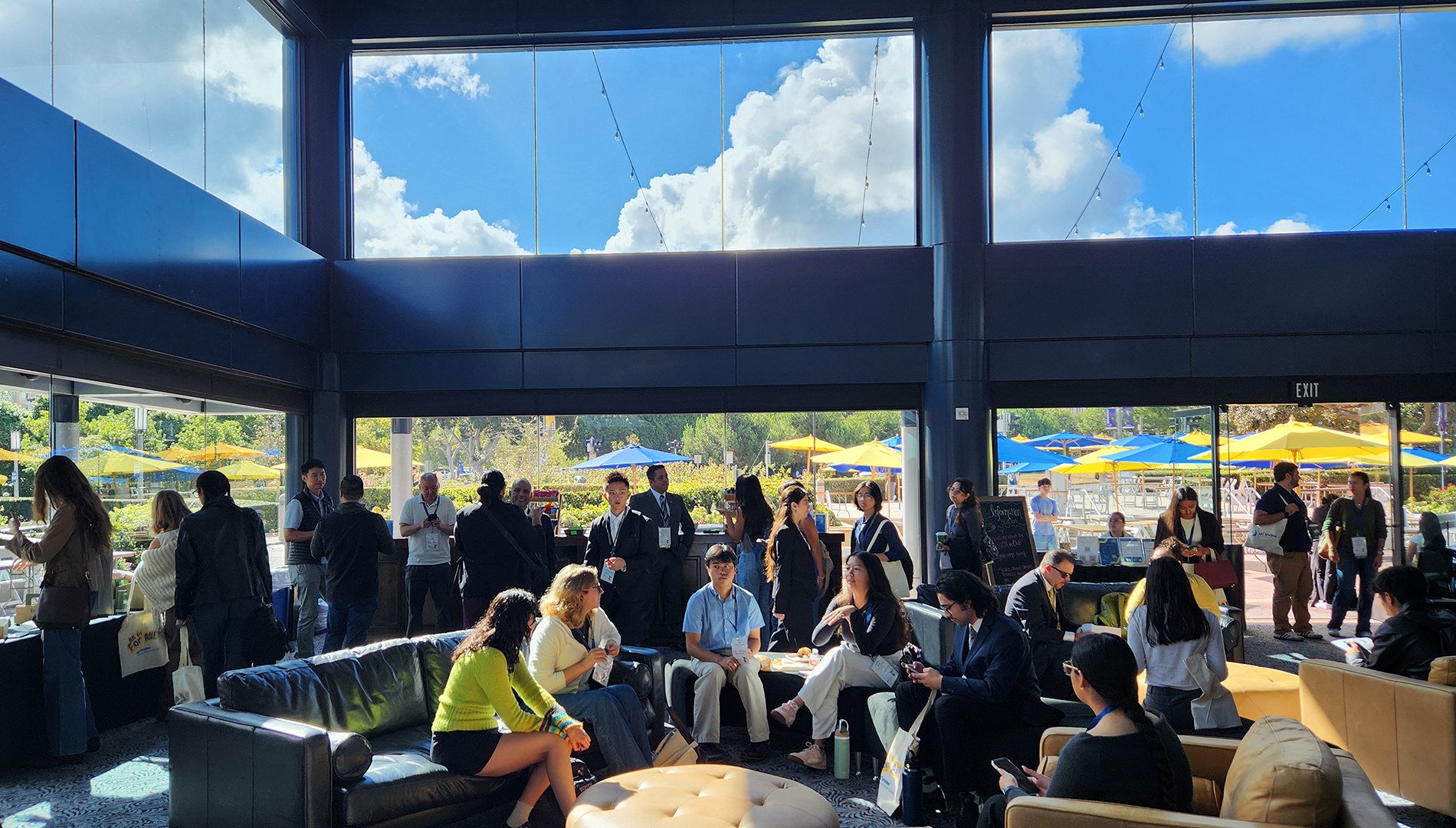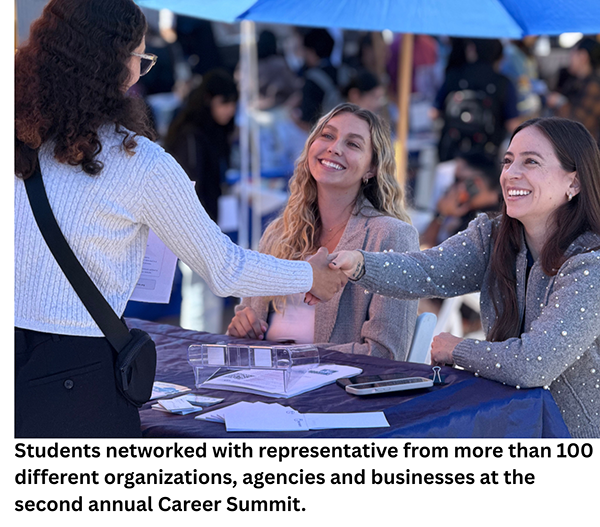
Students, alumni, faculty and pros come together for second annual event
Waiting in line for a free professional headshot by School of Social Ecology Digital Media Manager Han Parker, third-year criminology, law & society major Mackenzie Hotaling was asked what she was most looking forward to as the second annual Career Summit got underway Oct. 15.
“I’m really hoping to network and get a feel for field study,” she replied in the Irvine Barclay Theatre lobby, “especially regarding my major and seeing what path I want to go into – and really ask some professionals in the field.”
 The 100 professionals who participated in the Career Summit came from jobs and backgrounds as diverse as the School of Social Ecology’s three departments. But a common thread did emerge if one took the psychology, criminology, law & society and urban studies/environmental science & policy career panels as a whole: the importance of students participating in – and getting the most possible out of – the UC Irvine Field Study Program.
The 100 professionals who participated in the Career Summit came from jobs and backgrounds as diverse as the School of Social Ecology’s three departments. But a common thread did emerge if one took the psychology, criminology, law & society and urban studies/environmental science & policy career panels as a whole: the importance of students participating in – and getting the most possible out of – the UC Irvine Field Study Program.
The message obviously resonated not only with Hotaling but many if not most of the other 325+ attending Anteaters, based on the questions they asked and answers they received during the panel discussions in the theater’s main hall or the informal networking in the lobby after each presentation.
Another indicator: The most-attended of four sessions in the nearby Jade Room, based on the standing-room-only crowd, was “Field Study 101” led by Senior Field Study Program Coordinator Lizet Ceja, who highlighted the program’s many “wonderful opportunities” in traditional field study, advanced field study, the UCDC/UC Sacramento programs in Washington, D.C., and the state capital and studying abroad.
After coffee and pastry loading, the free, all-day event began with the urban studies and environmental science & policy career panel moderated by urban planning & public policy (UP3) Associate Professor Michael Méndez.
Panelist Dana Privitt mentioned that as a School of Social Ecology undergraduate, she raised her hand when a professor informed that the City of Newport Beach was seeking interns. After graduation, she was hired by the city’s planning department and later moved on to various consultancies, including her current role at Kimley-Horn and Associates in Orange.
“We have multiple MURPS working for us,” said Privitt, referencing students from UP3’s Master of Urban and Regional Planning program, “and a brand new undergraduate social ecology graduate who just started with us a month ago.”
“First and foremost, for anyone who is going to do an internship, or in social ecology it is required that you do an internship, that’s the best thing you can do,” said Carlos Feliciano, senior special agent with the U.S. Department of Homeland Security’s Office of the Inspector General, during the day’s second mainstage presentation, the criminology, law and society (CLS) panel.
“I highly recommend the UCDC program if you can do it,” Feliciano said of internships in Washington, D.C. that can fulfill School of Social Ecology field study requirements even though the program is overseen by the Office of Civic Engagement. “I was lucky enough to be selected as an intern for the U.S. Marshals Service in Washington, D.C. … It really gives you an inside look behind-the-scenes of how law enforcement works. And seeing the different roles inside the agency, seeing the culture and the vibe, for me it was really inspiring.”
The experience gained from field study and internships can be valuable, according to the namesake of the Law Offices of Adrienne D. Cohen, who noted that several of her paralegals and assistants hail from UC Irvine. “I love hiring from UCI,” she said, “they’re fantastic.”
Students in the audience at each panel asked whether they were on the correct educational path for their future careers, which sparked another theme of the day among several of the pros: Allow your different classes and field study experiences to establish the right direction for you.
A humorous moment came during the mainstage capper, the psychology career panel, when Mercer Employee Research Consultant Colleen Gillmore answered a student who asked how to find the correct career path with this: “Probably the best resource if you haven’t done this yet is your field study.”
Pointing to Career Services and Field Study Program Director Dmitry Tsukerman in the audience, Gillmore added, “I might be biased because I am married to Dmitry. So, I know a lot about field study. But that is a really great place to start.”
Most of all, panelists throughout the day reiterated that it is natural for undergrads to be unsure at this time of their lives about their educational and career goals.
During the urban studies panel, UC Irvine Climate Justice Initiative Academic Coordinator Robert Garcia revealed he originally came to campus to pursue a doctorate in social psychology, and the nonprofit Cool OC founder and Director Patty Oh said that after her undergraduate studies in social ecology and social sciences here, her original intent was to become a schoolteacher.
After a student mentioned she came to UC Irvine with an undeclared major before recently deciding to study CLS – and still being unclear about that choice – moderator and teaching Associate Professor Brandon Golob noticed two pros on his panel perking up.
“I actually came in undeclared,” Angela Gentry, a San Bernardino County Probation Department division director, told the Anteater. “I was thinking about that when you said that. I had no idea what I was going to do.”
A core class lit the fire for Gentry’s interest in the justice system, something Deputy District Attorney Kaitlin Radvansky of the Orange County DA’s Office could relate to.
“I was also undeclared when I came to UC Irvine,” Radvansky said. “My parents were very dismayed by that choice. They said, ‘It’s not even a major.’ So, I had no idea what I was doing.”
She dabbled in film and media studies, and then photography (“which I was like horrible at”). During an introduction to criminology and law class with teaching Professor Teresa Dalton, Radvansky took issue with an answer being marked wrong on a multiple-choice quiz and made that very clear to the instructor, who remarked, “You should be a lawyer.”
“It was in that moment, from one professor at UC Irvine, that really set me on that path,” the prosecutor said.
Tsukerman noted afterward that many professionals who took part in the Career Summit are UC Irvine alums, and many of those provide landing spots for field study students. Outside Irvine Barclay, 50 booths provided information about careers and internships with various programs, agencies and nonprofits.
“The second annual Social Ecology Career Summit was such a powerful reflection of who we are as a school — a community that deeply invests in our students’ futures,” says Tsukerman. “I’m so proud of our bright, motivated students who showed up eager to learn, connect, and grow.”
Besides “Field Study 101,” the Jade Room hosted sessions on crafting winning resumes and cover letters, nailing job interviews and improving LinkedIn profiles, the latter of which featured a rap by UC Irvine Antrepreneur Center Director Ryan Foland, who received enthusiastic applause. Each session ended with breakout groups of students meeting with Wells Fargo representatives who answered questions and drilled down farther on the topic at hand.
“This event highlighted our ongoing commitment to expanding the programs and services that help prepare our students for meaningful, impactful careers,” Tsukerman says. “We’re deeply grateful to our alumni and community partners who gave both their time and generous financial support to make this day possible. And I especially want to thank our Executive Director of Development, Stacy Skwarlo, and our entire planning team for their incredible work in bringing this vision to life for a second year in a row.”
– Matt Coker
Features